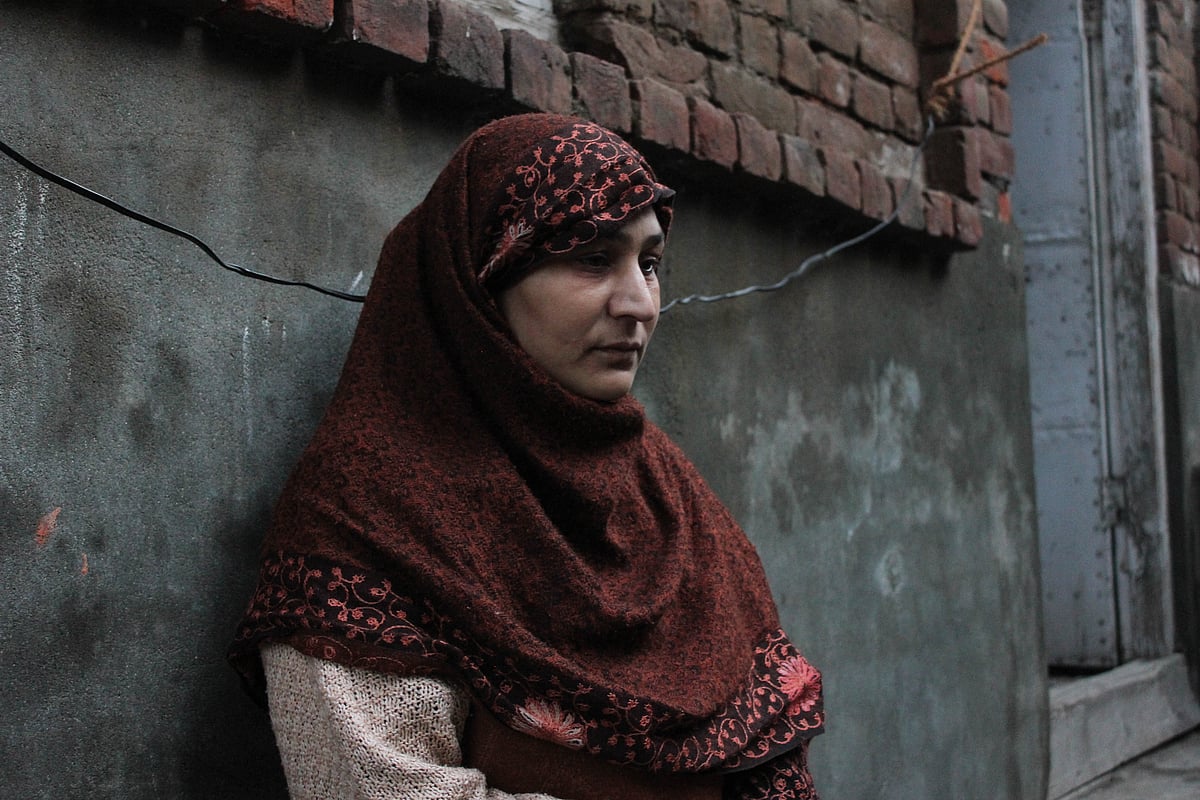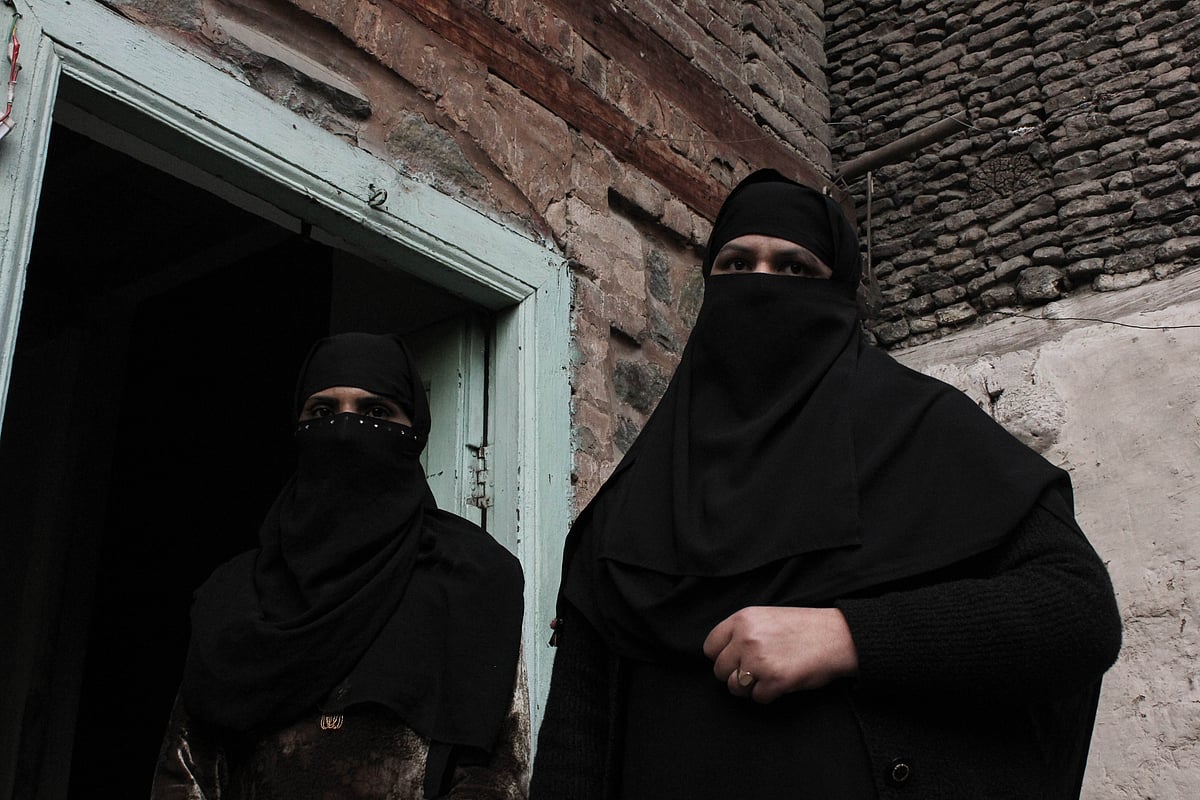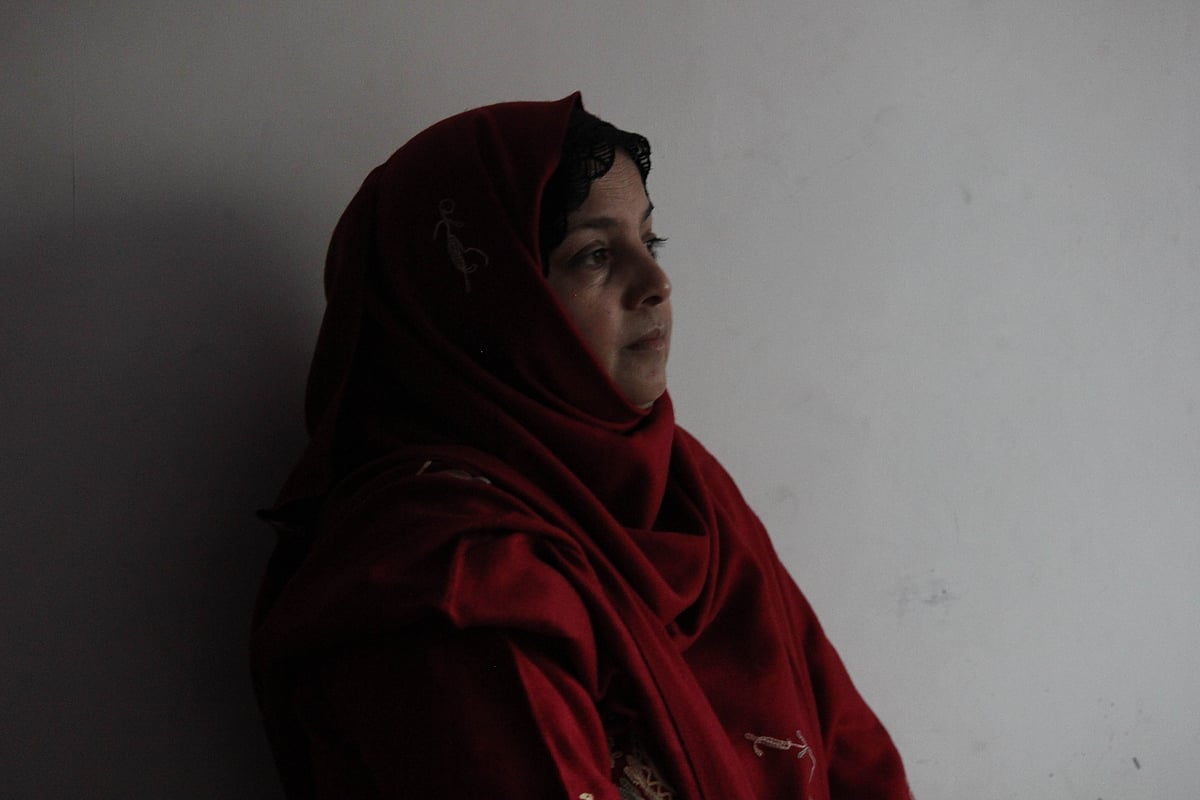Caught between war games: Women from PoK and Pakistan in Kashmir
The government says it will take time to say how many women from Pakistan and PoK are living in the Kashmir Valley.
Naseema Akhtar,31, adjusted her hijab as she whispered to me, “One morning, after the children left for school, my saab (husband) told me – “If a woman and her husband stand in front of a black-coloured mountain and the husband says the mountain is white in colour, then the woman must also say that it is white indeed. Only then will she go to jannat (heaven)”.” It was only for the sake of jannat that Akhtar who had resisted for three years finally gave in to her husband’s request. She packed her belongings, left her home in Pakistan’s Rawalpindi where she had lived for 31 years and moved to Kashmir in 2013.
Today, Naseema Akhtar, along with her three boys and her husband, live in a one-room house in Nawab Bazaar, Srinagar. They haven’t been able to pay the rent for the last two months, they don’t use any electricity during the day and the neighbour has given them 10 kg of atta (flour). It is a cold November evening in Srinagar as Akhtar’s son and guides her by hand to sit under the blanket. She stumbles, finds the ground, sits down and offers that I warm my feet under her blanket. Naseema Akhtar is almost blind. She developed night blindness at a very young age. “When I decided to marry my saab (my husband) my parents told him, she needs regular check-ups, medicines and a lot of care. Only after he agreed to come with me for a check-up did my parents agree,” she said.

Naseema Akhtar
Rawalpindi to Srinagar
In the early 1990s, when the insurgency broke out in Kashmir, Akhtar’s husband, like hundreds of young boys in Kashmir crossed the border to Pakistan-occupied Kashmir (PoK)/Pakistan for arms training. Some of them returned to Kashmir and fought the State, while many others eventually gave up the gun and settled down in PoK/Pakistan. After finding a job and a place to live, many Kashmiri men ended up marrying Pakistani women.
In 2010, the Government of India proposed a second militant rehabilitation policy. The policy proposed by the then Jammu and Kashmir chief minister Omar Abdullah, was termed a “big confidence-building measure”. It was projected as granting amnesty to Kashmiri youth who “had crossed over to PoK/Pakistan for training in insurgency but have given up insurgent activities due to a change of heart and are willing to return to the state.” The policy appealed to all men who had gone to PoK/Pakistan between January 1989 and December 2009. It also said, “wives, children and other dependents of those returnees who have married in PoK/Pakistan during the period 1.1.1989 to 31.12.2009, will be considered for entry into the country as per the existing laws of the land and the necessary certificate for entry will be issued to them”.
Apart from this, the policy promised that counselling centres would be established where all returnees along with their wives and children would be lodged for three months so that they can be thoroughly interviewed, debriefed and the state prepared necessary documents for them.
Naseema Akhtar said that she and her husband have got nothing from this policy. Akhtar’s husband used to run a mobile repair shop back in Rawalpindi. They came to Kashmir via Nepal. Initially, they lived with Akhtar’s husband’s family. “In the beginning, they were kind to me but soon everything changed. They used to give me burnt food, I didn’t have any clothes, his mother used to call me Pakistani kutti (Pakistani dog) and they made me do all the house work,” she said. According to Akhtar, after coming to Kashmir, her husband stopped talking to her and turned her children against her as well.
Due to lack of proper treatment, the condition of Akhtar’s eyesight diminished and currently she can only see vague structures if there is light. Eventually her husband began talking to her again, he apologised and the five of them moved into a separate house where they now stay. Currently, Akhtar’s husband does odd jobs like selling biryani or fishing. He makes an average of 2,000-3,000 rupees per month. This is not enough to sustain a family of five. A week ago, Akhtar said that overcome by frustration, he attempted suicide but came back three days later saying he could not stop thinking of their children. Akhtar’s children go to a government school where she had to beg authorities to let them study there but there are hardly any classes. Ever since her husband’s phone broke last year, Naseema Akhtar has not been able to speak with her family.
“We used to live such a lavish life in Rawalpindi, yahan aake sab kuchh bekar hogaya (everything has gotten useless here),” said Akhtar as she broke down.
Not one in a million
Akhtar’s is not the only such story. Both Shahida Mushtaq, 33, and Kouseer Aijaz, 35, along with five other families, came to Kashmir from PoK via Nepal with their Kashmiri husbands in 2012 and 2011, respectively. They both said that they agreed to come back only because the Indian government promised that they could go back to visit their families whenever they pleased. So far, neither of them have ever been able to return home.
Mushtaq and Aijaz were part of a group of Pakistani women, who had visited Mehbooba Mufti to discuss their problems. This was before she had come to power. “When we first met her, she said that if she came to power she would help us. When we went to her again after she won, initially, she didn’t even let us enter. Finally when we met her, she said “Go to Omar Abdullah, the policy concerning your rehabilitation was made by him not me.”
“If a woman cannot understand another woman’s problems then who will?” asked Mushtaq. “She even called us ‘sisters’ when we met the first time,” pitched in Aijaz.
Squatting next to Mushtaq, Kouseer Aijaz said, “My 14-year-old daughter died two years back. Forget about sharing happiness, I can’t even share grief with my own people anymore.” Aijaz said that the first year when she realised that there would be no going back, was the worst year of her life. “My family in PoK think that we have a luxurious life in Kashmir. I don’t tell them about our worries. At least in somebody’s imagination we are having a good life,” she said.
Shahida Mushtaq pitches in to say that neither of them have told their families in PoK that they can’t return.
Aijaz also adds that she is worried that her children will start pelting stones. She and her husband want to send them abroad for studies but they can’t seem to acquire passports. She said that it was also very difficult for them to find schools that would accept their children because they didn’t have the right papers. If they had to put them in a private school, they would have to pay a huge fee and their child would still be only informally enrolled. The other option is to send them to government schools where there isn’t proper education. “My children are angry. They keep saying that they are paying a price for something their father did. I’m so scared that the Kashmiri kids will influence my angry children to pelt stones and take part in this revolution”, she said.

Shahida Mushtaq (right) and Kouseer Aijaz
“Atankwadi, atankwadi, atankwadi! Thak gayi mein yeh sun sunke (terrorist, terrorist, terrorist. I’m sick of hearing this),” said Mushtaq. She said that on protest days she doesn’t let her children step out of the house. “My kids are an easy target. The police can catch them, kill them and label them Pakistani terrorist. No one will question them,” said Aijaz.
That cold afternoon, both Mushtaq and Aijaz had just returned from court. They both have pending cases against them which claim that they have illegally entered India. “You know, until I came here, I had never seen a court or a police station in my life. Now I spend most of my life going there and being told “sit there, sit here, come today, come tomorrow”. They don’t even talk to me properly because I’m Pakistani,” said Aijaz.
Status of women from PoK
While a woman from Pakistan can be called a foreign national, a woman from PoK cannot be cast away as a foreign national.
In 1994, a resolution of the Lok Sabha and the Rajya Sabha reinforced that the entire territory of Jammu and Kashmir is an integral part of India and asked Pakistan to vacate the area under its illegal occupation. Today, PoK is nominally self-governed while it remains politically administered by Pakistan. “The residents of PoK are issued Pakistani passport but the passport does not call them citizens of Pakistan. The passport says – Natives of former state of Jammu and Kashmir,” said Parvez Imroz, a human rights lawyer in Kashmir.
Last August, at the all-party meet in Jammu and Kashmir, Prime Minister Narendra Modi said PoK belongs to India and that “the time had come to expose Islamabad‘s atrocities in Balochistan”. “And if like the PM says, PoK is an integral part of India and its residents are all technically Indians, then everyone in PoK is entitled to state subjecthood. Moreover, according to Article 35(A), any woman who marries a permanent resident of Jammu and Kashmir becomes a state subject so either way these women should be given state subject certificates,” said Imroz.
Nevertheless, women like Shahida Mushtaq and Kouseer Aijaz from PoK are slapped with cases of foreign nationals attempting to illegally enter India and are not granted any official documents.
Since the Indian state has disowned them, Imroz said that the women from PoK have been rendered stateless.
Silence of the State
Shaziya Yusuf, 37, another Pakistani woman who came to Srinagar with her husband in 2013, asked a pertinent question – “Why are all the 300 Pakistani women who came with their husbands crying?” She asked if this is not enough for the government to sit up and take note of the situation.

Shaziya Yusuf
Nayeema Mehjoor, the chairperson of State Commission for Women in Jammu and Kashmir, told Newslaundry, “I have no idea about any of these women. Nobody has approached me with any grievances and neither have I been told of any.”
Why is it that the State has been so disconcertingly quiet on this issue?
Three important questions that remain unanswered are:
- How many Pakistani women are currently residing in Kashmir?
- What are these ‘necessary official documents’ that need to be handed to them when they come to Kashmir?
- Where are these lodging centres where these women and their husbands would be lodged for the first three months after their return?
When Newslaundry contacted an official, who wished to remain anonymous, to clarify these questions, he said, “You’re asking me to look for a needle in a haystack. I need to look for these records. Call me later.” When we reached out to him the next day, he said, “You see, this is not an issue pertaining only to Srinagar. Please contact the State Divisional Commissioner.” Regarding the data in Srinagar alone, he said, “Oh that also I’m digging. It will take me very long so I will call you once I have it.” When we spoke to Baseer Ahmad Khan, the state divisional commissioner, he also said he “needs some time to dig out the data”.
Nayeem Akhtar, the spokesperson of the People’s Democratic Party (PDP), remained unavailable for comment.
In 2013, an India Today article claimed, “So far, 212 Kashmiri youth, who had crossed to PoK from LoC, have returned in past three years from Nepal along with their family members.” According to the article, official sources said that in 2012 alone, of 150 former militants, 90 returned with families from PoK/Pakistan. In 2012, eight militants returned to Kashmir of which two of them came with families.
Home: A metaphor
For most of these women, life in Srinagar is drastically different from what it was in PoK/Pakistan. “I miss the sun in Pakistan. All the people back home look so fresh. They smile, they love, they joke. Here the soil reeks of suspicion and blood. I want to go back,” said Naseema Akhtar.
It is not just lack of official status that takes a toll on these women, it is also the cultural alienation and nostalgia of their life back in PoK/Pakistan. When we asked what all four of them would say to other Pakistani women who intend to accompany their Kashmiri husbands back to Kashmir, the unanimous answer was, “Do not come here.” “I have told them, if you want to become a toy that gets caught between the war games that these two countries play, then come. If you want to live peacefully, then don’t,” added Shaziya Yusuf.
Political theorist Hannah Arendt, in her essay on displaced Jews ‘We Refugees’, wrote a few lines that seem to resonate with the condition of these stateless women: “We lost our home, which means the familiarity of daily life. We lost our occupation, which means the confidence that we are of some use in this world. We lost our language, which means the naturalness of reactions, the simplicity of gestures, the unaffected expression of feeling.”
Home has become a metaphor for these women who feel that their very existence has become inconvenient for their husband and children. “Na hume jaane ki ijazat dete hai, na hume apnate hai. Phir iss mulk mein rehne se kya faida? (They don’t give us permission to go and neither do they call us as their own. What is the point of staying in this country?),” said Kouseer Aijaz.
